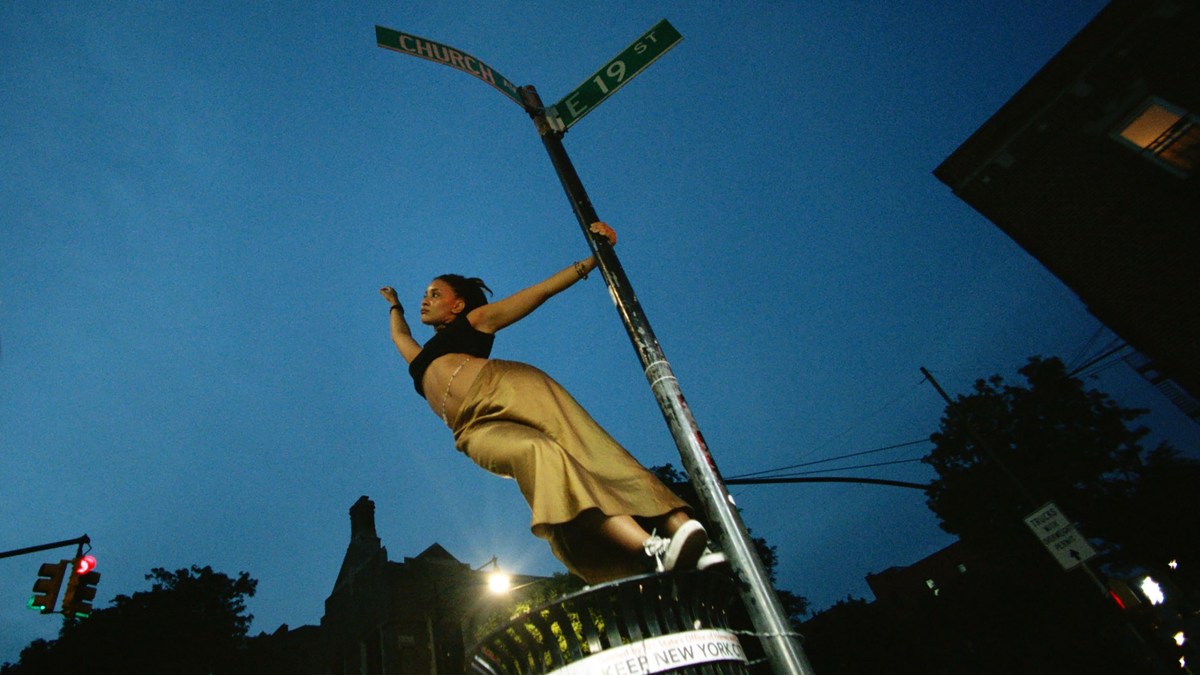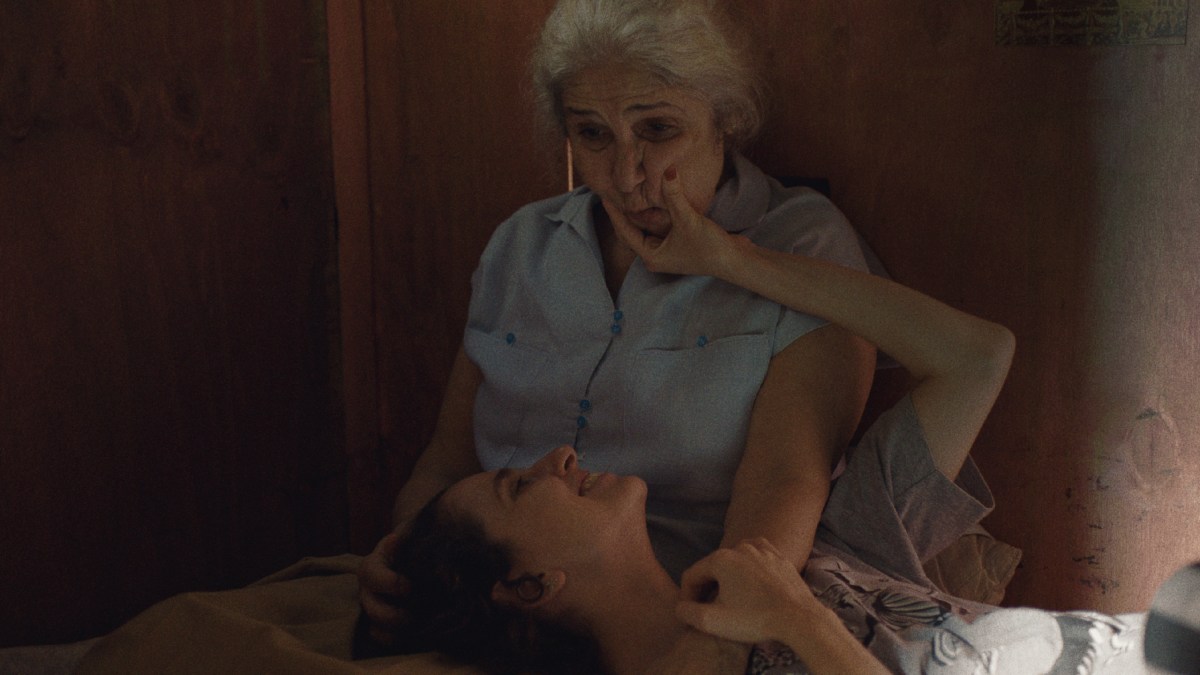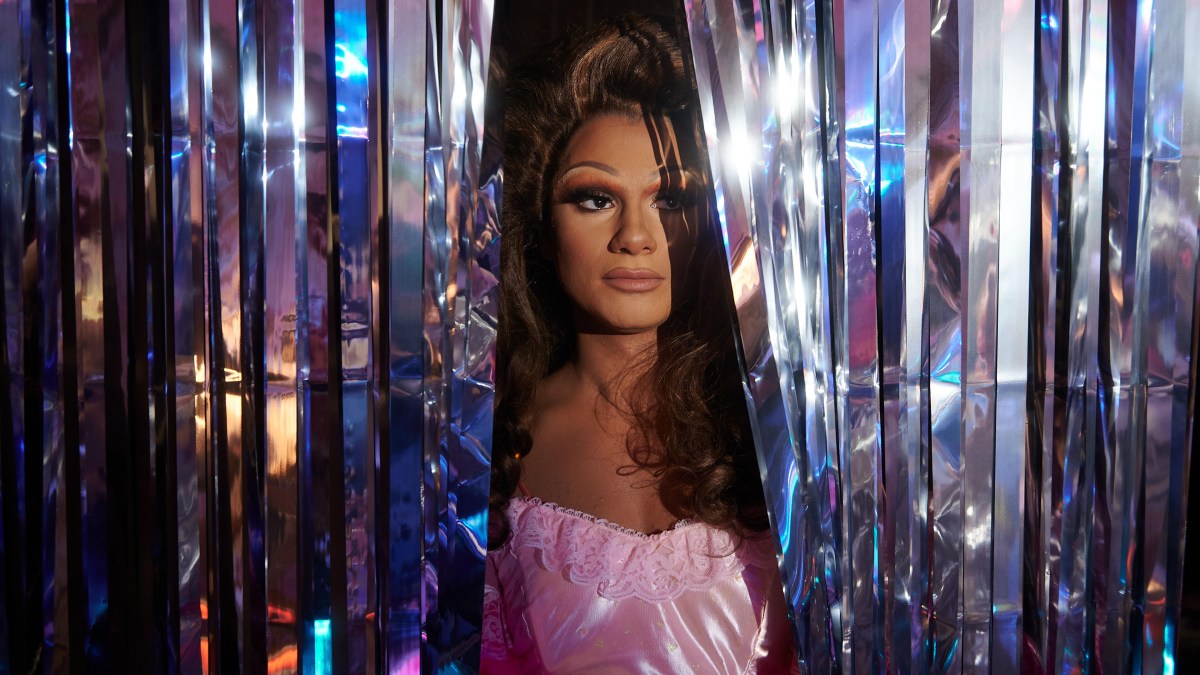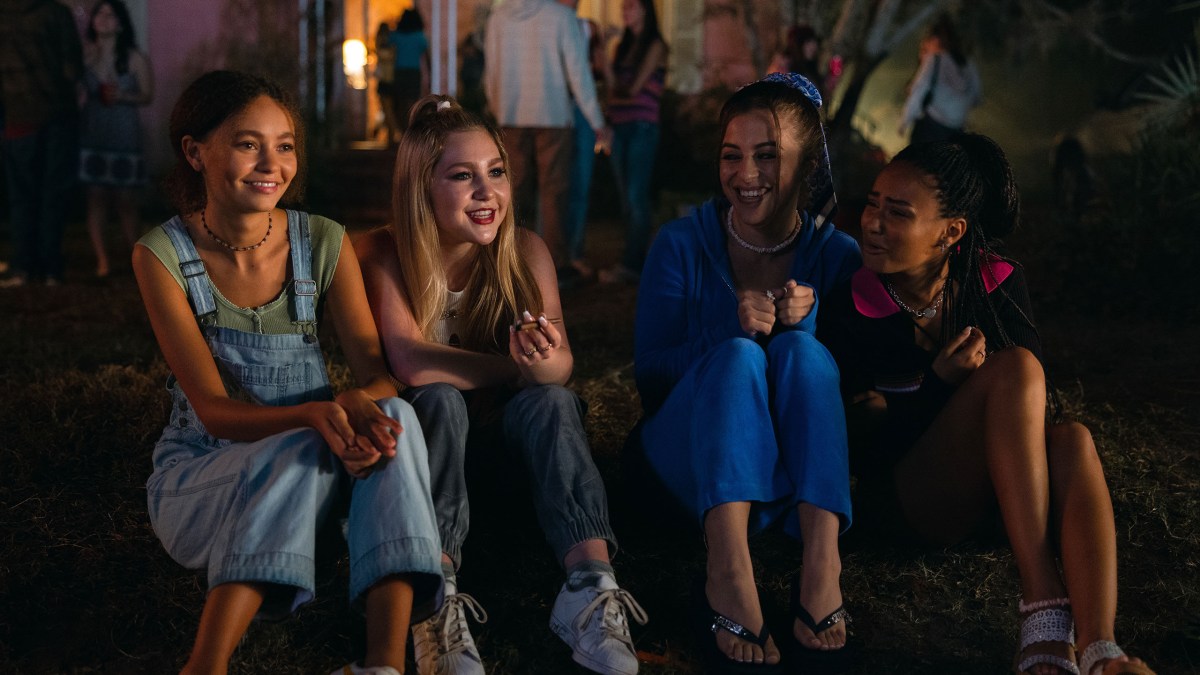Drew Burnett Gregory is back at Sundance 2024, reporting daily with queer movie reviews from one of the world’s most prestigious film festivals. Follow along for her coverage of the best in LGBTQ+ cinema and beyond.
I’ve been covering film festivals at Autostraddle for over four years. At first, I just reviewed a selection of queer titles, but starting with Sundance 2021, I began writing capsule reviews for every movie I watched. Usually, this post comes out at the end of the festival as a round-up — this year, for Sundance 2024, we tried something different.
Because Sundance has continued to split their festival between in-person and virtual screenings, most of the movies I watched could be watched by all of you at-home during their viewing window. That’s why this year I released my capsule reviews daily as I watch the films. I hope this gave some of you the chance to not only read about the films, but watch them for yourself! And, if not, don’t worry. Most of these films be released sometime in the next year.
I love writing about queer film — and a lot of these movies are queer — but I also believe there’s a great importance for queer and trans critical voices to respond to a wide range of cinema. I’m honored to have been one of those voices for another year at Sundance.
I Saw the TV Glow (dir. Jane Schoenbrun)
Brief History of a Family (dir. Jianjie Lin)
At first glance, Jianjie Lin’s debut feature appears to be an understated (and sexless) take on what I’d call a Teorema story and what audiences today might call a Saltburn. A mysterious stranger is welcomed into a bourgeoisie (or even wealthier) family and one-by-one the stranger develops connections with each person, tearing the family apart.
But Brief History of a Family approaches this familiar tale through the specific lens of China’s one child policy that began in 1980 and lasted until 2016. With a microscopic eye, the film zooms into the dynamics of this family and the ways they adjust — and fail to adjust — to the arrival of someone who becomes a second child, a new sibling. It’s a restrained work with occasional bursts of violence that may resonate more deeply with those more familiar with and affected by this policy, but that I still found rich and compelling through a broader lens. Many families are a combustive mix of contrasting energies waiting to explode.
Tendaberry (dir. Haley Elizabeth Anderson)
Part neorealist drama, part multimedia fantasia, Haley Elizabeth Anderson’s striking debut is a character study cracked open by its protagonist’s curiosity. Kota Johan plays Dakota, a 23-year-old who works at a drugstore in Brooklyn and spends her free time hanging with her Ukrainian boyfriend. When he returns to Kyiv to take care of his sick father, Dakota’s life begins to fall apart as challenges compound.
With its handheld cinematography — both gritty and dreamy — and its Brooklyn setting, the film recalls the work of Eliza Hittman. But its voiceover narration and use of archival footage feels unique to Anderson and to the inquisitive worldview of her main character. After over a century of cinema, it’s rare to get a portrait of New York that feels fresh, and yet by seeing the city through the specificity of Dakota, Anderson succeeds.
The film meanders with some chapters of Dakota’s life and interludes of Dakota’s thoughts feeling less essential for the story being told. But given Anderson’s cinematic talent and Johan’s on-screen presence, even these moments are compelling to watch. It’s a film as unruly and magnificent as the character and city it portrays.

Kota Johan in Tendaberry
Love Machina (dir. Peter Sillen)
Martine and Bina Rothblatt want their love to live forever. That’s why nearly two decades ago they began recording “mindfiles” and eventually uploaded them to a humanoid robot modeled after Bina, named Bina48.
Martine, the inventor of satellite radio, is a trans woman. And there’s something compelling about this future-minded CEO who feels no limits in her work, her gender, her love, or even her eventual death. There is a compelling story to be told about this couple who have four children together and refer to themselves by a combined name. (They prefer to think of themselves as one entity rather than two.)
But this documentary falters in its attempts to contextualize their story. While the film does allow space for those who question the actual intelligence of Bina48 and the complications of using a Black woman as a model for a robot largely designed and handled by white men, the film still feels too safe in its approach to this complicated story. As much as I despise the recent onslaught of supposed “AI” and its impact on multiple industries, I’m hesitant to ever dismiss any technology outright. And yet I found myself frustrated with the framing that Martine’s transness is somehow a signifier of her futurist perspective. Trans people are not a sign of the future. We have always existed. Humanoid robots, however, have not.
Powerful people seeking a cure for death have also always existed. They have not succeeded and nothing about this surface-level documentary convinced me that will change.
Frida (dir. Carla Gutiérrez)
Black Box Diaries (dir. Shiori Ito)
Is the point of journalism to gather and present facts or to reinforce the narratives of the powerful? This is what I often question when people fetishize objectivity in journalism.
A young journalist herself, Shiroi Ito used her investigative skills for her own case after she was sexually assaulted by established journalist Noriyuki Yamaguchi. While unconventional for someone to be both the subject and the reporter, it was her only option when ignored by law enforcement — due to antiquated Japanese rape laws and Yamaguchi’s connection to then Prime Minister Shinzo Abe.
Ito’s case — and her book Black Box about the case — helped launch Japan’s Me Too movement. This documentary is a personal account of Ito’s fight to have her voice heard, as well as a display of much of the primary evidence she gathered. It also shows the journalistic possibilities of someone being both subject and reporter. There is a truth revealed in this telling that wouldn’t be possible without Ito’s own voice. We are allowed to see not only the facts of her case, but the immense toll this fight takes on her life. To not witness that part is to not witness the entirety of the truth. Sometimes a polished presentation of information is even more incomplete than subjectivity.
Watching the film, Ito is impressive in her courage, in her commitment to justice and truth and creating a better society for all. But the most important parts of the film are when she lets us see her exhaustion, the passage of time, the cruelty. Even the most impressive activist, the most impressive survivor, the most impressive journalist, is still a human being.
Malu (dir. Pedro Freire)
A portrait of three women — and three generations in Brazil’s volatile 20th century — Pedro Freire’s debut is a layered and captivating character drama. The titular Malu (Yara De Novaes) is a former stage actress living in 1990s Rio with her religious mother (Juliana Carneiro Da Cunha) and her younger queer friend, Tabira (Átila Bee). They are frequently visited by Malu’s daughter Joana (Carol Duarte), also an actress, who is torn between her radical mother and conservative grandma.
Anchored by four stunning performances, Freire doesn’t hold back, allowing his characters to fight as hard as they love. Their conflicts are fundamental, going beyond the interpersonal and encompassing issues of politics, illness, and generational trauma. There are gulfs between these characters — especially the three women — that no amount of care can traverse.
A film as much about generational disappointment as it is personal and familial disappointment, Freire deftly explores specific and universal discord while always prioritizing character. This is a remarkable film — a work of urgency, a work of compassion, a work of love.

Carol Duarte and Juliana Carneiro Da Cunha in Malu
Sebastian (dir. Mikko Mäkelä)
Igualada (dir. Juan Mejía Botero)
While I relish the opportunity to be educated about another country’s political process and to learn more about current Colombian Vice President Francia Elena Márquez Mina, I wish this documentary went deeper. It presents a simple portrayal of Márquez’s unprecedented grassroots presidential campaign and introduction to the Márquez as a person but only hints at complication.
There’s a moment when one of Márquez’s most loyal staffers begins to doubt the possibility of their movement existing within the political structure at all. It’s a question that is not explored further, because the film ends when it should begin. Márquez is named as Gustavo Petro’s running mate and the rest is told in the credits.
Given the threats of violence Márquez faces and her current position in government, it’s understandable that there were limits to what this documentary could be as a film. The archival footage of Márquez over a decade ago shows how committed she was to her community and country long before she became a sensation. With Márquez’s future and the future of Colombia in mind, it makes sense the film could look back with a clearer eye than it looks forward. Ultimately, it’s strategic to lean toward the simple, to lean toward the inspirational — at least, it’s a strategy for a worthwhile cause.
Girls Will Be Girls (dir. Shuchi Talati)
Until she meets new student Sri, 16 year old Mira is so perfect she’s her class prefect. She studies hard, cares about the rules, and seems even more conservative than her vivacious mother. But she’s still a teenager and once she falls for Sri, she’s determined to explore her sexuality with the same success she’s always brought to the sciences.
There have been many stories of adolescent sexual discovery on-screen. Schuchi Talati’s film stands out due to the unique relationship between Mira and her mother. Having married Mira’s father young, at a more conservative time in India when casual dating wasn’t an option for her, she’s as in need of stimulation and freedom as her daughter. This results in a dynamic where she seems to be competing for the attention of her daughter’s new boyfriend — something that less delicately would belong in a psychosexual thriller, but here is alternating sad and human and frustrating and tender. Preeti Panigrahi as Mira and Kani Kusruti as Mira’s mother create characters that are both recognizable and unique.
This film shows the nuanced impact of patriarchy past and present and the unlikely bonds we can form to fight back.
The Mother of All Lies (dir. Asmae El Moudir)
A staggering work of documentary filmmaking, Asmae El Moudir recreates her personal history and a tragic chapter in Morocco’s history with her family as witness. Using miniatures constructed by her and her dad, El Moudir finds a way to capture a story hidden by her grandmother and buried by the government.
With the cinematic eye of the best stop motion filmmakers, El Moudir’s use of miniatures goes beyond gimmick or mere necessity. The recreations are gripping and emotional, the hovering bodies moving the tiny people and objects only add to their power. It’s a combination of group therapy and a journalistic documentation of state violence. The horrors inflicted on people are passed down through the generations — whether or not the horrors themselves are discussed openly.
In the Summers (dir. Alessandra Lacorazza)
In the Land of Brothers (dir. Alireza Ghasemi, Raha Amirfazli)
A triptych of stories about Afghan refugees in Iran, this is a furious work of political filmmaking told through a series of tender stories. Each a decade apart — 2001, 2011, and 2021 — every chapter revolves around a secret, one member of this family concealing something unfathomable in order to protect another.
Iranian filmmakers Alireza Ghasemi and Raha Amirfazli reveal the empty compassion of the surrounding Iranian citizens. Their acts of supposed kindness are as self-serving as their government that only grants citizenship to the family’s of deceased soldiers. There is an immense gulf between the Iranian people and the Afghan refugees that recalls similar dynamics around the world. Almost every place has a select group spared even the knowledge of the hardship that surrounds them.
But the film would not work as a political statement if it weren’t for the performances of Mohammed Hosseini, Hamideh Jafari, and Bashir Nikzad as the chapters’ three leads. They layer their characters’ desperation and grief with a humanity that denies pity. Their characts do what they have to do to survive and to take care of their family, but they shouldn’t have to. No one should have to endure these trials.
While the film is most overtly critical of Iran, it’s impossible to watch this as an American and not feel the impact of our country’s international violence. How many families were made refugees due to the various conflicts of the Cold War? How many more in the wars following 9/11? How many more today as the U.S. backs Israel’s genocide against Palestine? The twenty years of the film are also the twenty years of the U.S. invasion of Afghanistan. How many more families became refugees in those two decades? Where did those people end up? What were they made to endure? What are they still enduring today?

Hamideh Jafari in In the Land of Brothers
Agent of Happiness (dir. Arun Bhattarai, Dorottya Zurbó)
Following Amber, a man who works for the Bhutanese government’s happiness index, this documentary reveals the impossibility of measuring something as complex as a good life. At first, it appears the story will be a simple portrait of rural contentment as individuals explain their happiness by their children and number of cows. But as Amber contends with his own dissatisfaction as someone undocumented and unmarried, the film spends time with other Bhutanese people struggling to find joy.
One of these individuals is a trans woman who describes her fear, her loneliness, and her desire to be more beautiful. And yet, like gender, happiness is not a binary. Some of the film’s most touching — and happy! — moments are between this woman and her loving mother. It shows even when we’re faced with hardship, we can find respite in those who love us fully.
Well-balanced between its various real life characters, Agent of Happiness also succeeds in showing the absurdity of a government measuring happiness while being the cause of misery. Amber and his family are denied citizenship despite being born in Bhutan. Many individuals interviewed say they can’t even consider happiness when they’re so busy working. When the — very high — happiness rating flashes on-screen before the credits, it shows this whole endeavor to be a charade. Numbers can’t capture human emotion — but the tender and astute snapshots of this documentary succeed where the data fails.
Reinas (dir. Klaudia Reynicke)
Toward the end of the film, mostly single mom Elena (Jimena Lindo) admits things are bad in the politically tumultuous Lima of the early 90s, then adding, “But we’re privileged.” It’s that privilege that allows most of this film to have the laidback vibe of a largely uneventful family dramedy. The father of Elena’s kids (Gonzalo Molina) has returned just as they’re set to leave the country and he’s full of jokes, charm, and lies. There are mentions of a curfew, but otherwise the focus is the family.
But bourgeois privilege is insufficient protection. And the abrupt tonal shift in the film’s last act is a fitting reminder of the often blurred lines between our intimate dramas and the political dramas taking place around us. With an excellent soundtrack, strong performances, and a formal patience that matches the film’s plotting, this is a strong work that balances the micro and macro of life.
Desire Lines (dir. Jules Rosskam)
Love Me (dir. Sam and Andy Zuchero)
A love story between a satellite and a smart buoy taking place long after the extinction of man, Sam and Andy Zuchero’s debut is funny, devastating, and undeniably audacious. None of this would work without the incredible performances from Kristen Stewart and Steven Yeun as both an influencer couple the smart buoy idolizes and the human manifestations of the buoy and satellite in their shared cyber space.
While the film is less original when it explores the challenges of human marriage, it’s wonderful when its satellite and buoy are searching for humanity and companionship. An immense amount of emotion is projected on the buoy and satellite even in their natural forms — and this is without the humanizing animation of a movie like Wall-E. Like last year’s Crimes of the Future, this film is a showcase for Stewart’s comedic talent. Even when she’s just a voice represented by a crude avatar, she’s able to communicate as much with humor as she is with pathos in the film’s more painful moments.
.There’s some fun hints at sexual and gender queerness in a scene where the sentient beings question whether this influencer couple is indeed their best representation. I wish more time was spent on this moment and with an expansiveness of physical self akin to their internal explorations. While not without its imperfects, Love Me shows what’s possible when sci-fi focuses on character, performance, and ideas over big budget effects and non-stop action.

Kristen Stewart and Steven Yeun in Love Me
Sue Bird: In the Clutch (dir. Sarah Dowland)
The most interesting aspect of this documentary portrait of the famous basketball player is that it’s unafraid to be, well, uninteresting. While it touches upon her parents’ divorce, her injuries, and some tough losses, there isn’t much story in this story. Based on this film, Sue Bird seems to be just a really incredible athlete who worked really hard throughout her career. The makings of an Oscar-winning biopic this is not.
But plenty of male athletes have received documentaries simply for being great at their sport. And it’s enjoyable to watch what ultimately amounts to a highlight reel for Bird with commentary from herself and the people in her life.
The film also takes time to show how women’s sports have changed since Bird began. From minimal press attention to bringing Nick Carter to the ESPY’s as a beard to playing overseas, through Bird the film shows how things have improved and how there’s still a long way to go.
For many, the real draw of the film are the cute little moments captured between Bird and Megan Rapinoe. The two of them recount their first meeting at the Rio Olympics, but even better than the polished montage of their relationship are the glimpses of their relationship throughout. It’s very cute!
Power (dir. Yance Ford)
Dìdi (弟弟) (dir. Sean Wang)
Recently nominated for the Best Documentary Short Oscar, filmmaker Sean Wang’s debut feature thrives on its specificity. Yes, this is a coming-of-age movie that follows familiar beats. It still feels wholly unique because it’s specifically set in the summer of 2008 and specifically takes place in Northern California. It specifically focuses on a Taiwanese American boy who is a younger sibling and has an artist mother and a mostly absent father. It’s specifically about Chris Wang.
Each facet of Chris and Chris’ life is explored with an eye for detail. The 2008 setting doesn’t merely evoke nostalgia — it allows for a nuanced examination of how racism and pressures of masculinity manifested at that time and in this place. It has the cringe-filled moments of humor and the tender moments of emotion one might expect from the genre, but here it’s all servicing several ideas and experience often under-explored, or, at least, rarely explored this well.
Izaac Wang as Chris, Joan Chen as his mother, and Shirley Chen as his sister all give deeply felt performances, capturing the fraught bonds and inherent intimacies of a family. Every year there are wonderful coming-of-age movies made about women and queer people — this is the smartest and most effective straight boy coming-of-age movie I’ve seen in a long time.
Never Look Away (dir. Lucy Lawless)
Lucy Lawless begins her directorial debut about war photographer Margaret Moth by centering Moth’s longtime lover who she began dating when she was 30 and he was only 17. That man recounts their meeting and how Moth upended — and derailed — his life with her furious hunger for pleasure and control.
It’s a bold choice in a documentary that’s ultimately rather celebratory. But it reveals Lawless’ willingness as a filmmaker to capture her subject in full. To celebrate Moth’s unique personality and accomplishments is not dependent on smoothing over her complications.
Lawless takes this same approach in covering the many wars, conflicts, and genocides, Moth captured throughout her career. There’s a matter-of-factness in the interviews and recollections of these moments of recent history. It’s an approach worthy of its subject who seems to have had both a deeply felt compassion for humanity and a deep disdain for its cruelty. And it’s an ethical necessity at a time when similar atrocities — or, in the case of Israel’s violence toward civilians and journalists, the same atrocities — continue today.
As one interviewee states, if something is not recorded it will never change. If something is recorded it also might not change. This documentary records Moth and the violence she encountered. It might do nothing. It’s still important to look.
Stress Positions (dir. Theda Hammel)
Layla (dir. Amrou Al-Kadhi)
While recent years have brought an influx of movies about drag performers, this is the first I’ve seen where the performers lament having to work brunches and corporate events. It’s the understanding of the lived experience of drag as a job that allows the world of Layla to feel lived in and real.
Amrou Al-Kadhi’s debut feature is constructed like a romcom. Their titular protagonist meets a white normie at one of the above mentioned corporate events and after a night of partying they begin to date. Unfortunately, from the beginning it’s clear this pair isn’t going to work. It’s not just their differences in race and class and queerness, there’s also a lack of true connection. Their relationship is built entirely on projections.
Ultimately, this is not a romcom — it’s an indie dramedy. And, while there’s a lot of truth and care brought to the world of the film and to its themes, I wonder what it might’ve been like if more time was spent in Layla’s community and less with the doomed romance. Or if the lack of connection in the romance was withheld longer, so we, as an audience, could go on the same emotional journey as Layla.
But in a cinematic landscape where so many versions of this story are told poorly, Layla is a welcome respite. Like its protagonist, it may be imperfect, but it puts on quite a show.

Bilal Hasna in Layla
Grace (dir. Natalie Jasmine Harris) (short)
A Real Pain (dir. Jesse Eisenberg)
At Sundance 2022, Jesse Eisenberg’s directorial debut was one of my least favorite films, so what a nice surprise to see his voice grow into this lovely dramedy. Following cousins on a trip to Poland to visit their recently deceased Holocaust surviving grandma’s old home, Eisenberg has crafted a new take on the odd couple story. The cousins are perfectly written for Eisenberg and co-star Kieran Culkin and it’s so fun to watch them bounce off each other and the people around them.
Eisenberg’s previous film was invested in question of how to exist in the world with privilege. But where that film had a mean self-importance, this has a tender uncertainty. It’s a very Jewish film in the ways it asks questions without providing answers. It’s at once a Warsaw travelogue, a buddy comedy, and a meditation on how to live in our cruel world. With a balance of tones and an attention to character, Eisenberg has found his own worthy cinematic perspective.
Handling the Undead (dir. Thea Hvistendahl)
I love slow horror and this Danish zombie movie is definitely slow. The problem is the pace isn’t necessarily in service of anything all that interesting. The characters are thin and the thematic depth doesn’t go far beyond “the challenges of accepting death.”
But even if I found this film to be underwhelming, the craft on display is undeniable. It’s beautifully shot, well-acted, and has a gorgeous score. Director Thea Hvistendahl has a history in commercials and music videos and there are sequences within this feature that are stunning on their own. This is the kind of film that’s frustrating not because it’s bad, but because of how much talent is on display. This film’s unfulfilled potential has me interested to see what Hvistendahl does next.
Suncoast (dir. Laura Chinn)
With an unsubtle and inconsistent 2005 setting, a poorly structured and broadly written script, and an awkwardly apolitical point of view, Suncoast is the biggest disappointment of the festival.
This is a personal story for writer/director Laura Chinn and I appreciate her desire to tell a story close to her own adolescence. The most compelling part of the story — the young protagonist’s brother is in the same hospice facility as Terri Schiavo — is true to Chinn’s experience and it’s frustrating this unique experience is too often surrounded by stock characters, plot contrivances, and an overwrought approach to material that didn’t need artificial emotion.
There are debates to be had about the film’s focus on being the caregiver to someone sick and how it presents the Schiavo case, but frankly it isn’t strong enough on a fundamental level to argue about its politics. Nico Parker gives a great lead performance and Laura Linney and Woody Harrelson are reliably excellent (even if Harrelson’s character is a baffling addition to the story) — it’s not enough to salvage the script.
While it may still elicit tears due to its subject matter, Suncoast smooths out its emotion with an attempt at crowd-pleasing that only creates distance.

Nico Parker, Ella Anderson, Ariel Martin, and Daniella Taylor in Suncoast
Ponyboi (dir. Esteban Arango)
Good One (dir. India Donaldson)
A confident work of subtlety and truth, India Donaldson’s debut feature captures the unique experience of being gay and hanging out with your dad and his best friend.
17 year old Sam (a perfect Lily Collias) isn’t exactly excited to go on a hike/camping trip with her dad (James Le Gros). But it’s what he loves to do and it’s how they bond and it’s what’s expected of her. He has another young kid with his second wife and Sam seems to enjoy the time with her dad. Her dad’s best friend’s son is not as easy going — he opts out of the trip leaving Sam alone with the two men.
This isn’t a film of heightened drama, but of quiet betrayals. Over the course of a few days, Sam is confronted with the failures and continued failings of these adults. Good One is extremely specific to these characters and to the experience of being a young woman around old men and to the experience of being a queer young woman around old men. This film wasn’t labeled an “LGBTQ+ Story” by Sundance and that’s a real oversight — not only because Sam is explicitly queer, but because Sam’s queerness is deeply ingrained in the way her dad and his friend treat her and even more so in how she responds to them.
This one is for all the queer girls who were forced to parent their parents, who learned to out dad their dads.



loooooove the under-appreciated art of the micro-review and WILL be following along !
This is such a great way to do this!
I’m just glad Drew took the care to write Colombia with correct spelling. It’s a small but powerful way of showing respect for my country and it warms my heart.
Do you have Guts on your list? It’s a short. I haven’t seen it, so I don’t actually know if it’s queer, but it was written by someone I grew up with who is non-binary. Fun fact: we also grew up with Jane Schoenbrun! Love that the gay agenda worked in our little 5,000 person suburban town.
Ah that’s so cool! I don’t think I’m going to have a chance to cover shorts, but I’ll definitely keep it on my radar for the future.
I changed my mind and decided to watch some shorts. This one wasn’t explicitly queer, but I’m glad I watched. Thanks for recommending!
echoing others that I love pairing this micro review format with a selection of more in-depth write-ups. please keep doing this in the future!
Amazing!!! Looking forward for more info. I loved this site so much :)
I’m sad and disappointed that Shelli Nichole wasn’t mentioned in the Sundance coverage this year. Last year you lauded her for getting you into Sundance, and she was such an important part of the coverage. I’m still disappointed in the way the subject editors were let go, and I had hoped that at least Shelli would be thanked for her work last year, in this year’s coverage of sundance.
I covered Sundance by myself in 2021 and 2022. And my guess is even Shelli would rather you subscribe to her substack and read her Sundance coverage than waste your time commenting on mine.
I absolutely loved this roundup of queer and trans cinema at Sundance 2024! It’s exciting to see such a rich diversity of stories being showcased—from the futuristic Love Machina to the emotional depth of Malu. These films are so important for visibility and representation, and it’s great to see how they’re pushing boundaries in both form and content. Your insights into each film are spot on, and I’m definitely adding several of these to my must-watch list. Thanks for the thoughtful recap!